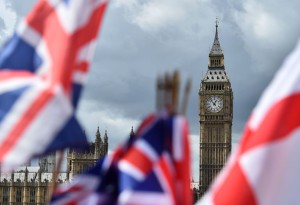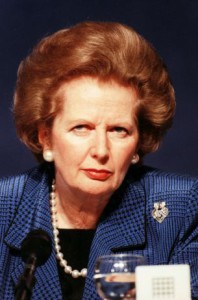L’immagine impressionante di una nazione un tempo orgogliosa del proprio pragmatismo non meno che della propria economia aperta, oggi invece incapace di tenere a bada le pulsioni più demagogiche e populiste, che con la Brexit la stanno portando a un suicidio economico
.
Articolo di Steven Erlanger (*) pubblicato sul New York Times il 4 novembre 2017 – In argomento, tra i molti documenti e interventi pubblicati su questo sito, v. anche il mio editoriale telegrafico del 26 giugno 2016 E se invece non uscissero affatto? e quello del 7 novembre 2016 Se l’Alta Corte spinge di nuovo il Regno Unito alle urne; inoltre il video “Voglio dare indietro la Brexit: non funziona come è stata reclamizzata”
.
.
BRUSSELS — Many Britons see their country as a brave galleon, banners waving, cannons firing, trumpets blaring. That is how the country’s voluble foreign secretary, Boris Johnson, likes to describe it.
 But Britain is now but a modest-size ship on the global ocean. Having voted to leave the European Union, it is unmoored, heading to nowhere, while on deck, fire has broken out and the captain — poor Theresa May — is lashed to the mast, without the authority to decide whether to turn to port or to starboard, let alone do what one imagines she knows would be best, which is to turn around and head back to shore.
But Britain is now but a modest-size ship on the global ocean. Having voted to leave the European Union, it is unmoored, heading to nowhere, while on deck, fire has broken out and the captain — poor Theresa May — is lashed to the mast, without the authority to decide whether to turn to port or to starboard, let alone do what one imagines she knows would be best, which is to turn around and head back to shore.
I’ve lived and worked for nine years in Britain, first during the Thatcher years and then again for the last four politically chaotic ones. While much poorer in the 1980s, Britain mattered internationally. Now, with Brexit, it seems to be embracing an introverted irrelevance.
The ambitious Mr. Johnson was crucial to the victory of Brexit in the June 2016 referendum. But for many, the blusterings of Boris have lost their charm. The “great ship” he loves to cite is a nationalist fantasy, a remnant of Britain’s persistent post-imperial confusion about its proper place in the world, hanging on to expensive symbols like a nuclear deterrent while its once glorious navy is often incapable of patrolling its own coastline.
“People need to look again at Britain,” said Daniel Brössler, a correspondent for the German daily Süddeutsche Zeitung. “It’s no longer the country they understood it to be their whole lives.”
The divorce negotiations with the European Union start another round this week, but they are not going well, to say the least. The most visible fight is over the cost of the divorce. But other difficult and essentially political issues about the authority of the European Court of Justice and a customs border with Ireland must also be clarified before the other 27 member states agree to move on to the next stage, Britain’s future relationship with the bloc. That decision next month once seemed pro forma, but no longer, with some even predicting a breakdown in the talks.

Theresa May
Mrs. May’s Conservative government is now so split that some Brexit supporters are calling on her to simply quit the bloc with no deal at all — probably the worst alternative for the country, but just the kind of populist, tub-thumping gesture favored by the Brexit elite and the right-wing tabloids.
Meanwhile, with the Conservative government so riven and rudderless, the old hard lefty Jeremy Corbyn is leading the opposition Labour Party back into an equally fantastical socialist past.
Britain is undergoing a full-blown identity crisis. It is a “hollowed-out country,” “ill at ease with itself,” “deeply provincial,” engaged in a “controlled suicide,” say puzzled experts. And these are Britain’s friends.
“The sense in the rest of Europe is bewilderment; how much worse can it get?” said Tomas Valasek, a former Slovak diplomat who lived in Britain for many years and now directs Carnegie Europe, a Brussels-based research institution. “After Brexit, no one is trying to help now. They’ve given up. Nobody on the Continent really cares that much about Britain anymore. Even worse, people feel the country will fall into the hands of Jeremy Corbyn and that will do more damage than Brexit itself.”
More chilling, perhaps, is the impact on countries less rooted than Britain once appeared to be. “Britain is an example for all of us, as a longstanding democracy, with centuries of the rule of law and traditional institutions,” said Guntram Wolff, a German economist who runs the Bruegel research institution here. “And if such a country has such difficulties, most of us wonder how our own countries would handle such political upheaval — whether we, too, are so vulnerable.”

Margaret Thatcher
Some make the comparison to that other great Anglo-Saxon country, the United States, under President Trump, who saw Brexit as a harbinger of his own election. But however politically divided the United States seems now, Europeans have never considered it a touchstone of stability the way they have Britain.
Jan Techau, a German who has traveled extensively in England and ran Carnegie Europe, sees Britain as a tragedy. The European country considered the most outward-looking and globalized is fractured by the backlash against the very model that made Britain strong. “It’s very sad, but Brexit is a controlled suicide,” he said.
There are many who see Britain as having suffered a sudden nervous breakdown, said Simon Tilford, an economist and deputy director of the Center for European Reform. But he believes that Britain’s political culture and economic stability have been eroding for some time, hidden by the longstanding willingness of others to give it the benefit of the doubt as a pragmatic democracy with a strong civil society and civil service.
He too blames the Conservatives and the right-wing tabloids that support them for much of the erosion. “The readiness of the political right in particular to lie and peddle obvious untruths, to place their party politics and party unity over and above the national interest, has been going on for a long time,” he said. “The harrumphing nationalism masks a country ill at ease with itself.”
Rather than a vote for a global Britain and economic liberalism, Mr. Tilford said, Brexit was a vote for protectionism, and its political system now “is deeply provincial and introverted at a time when Britain is supposed to be heading out into the world.”
The divisions in the society — over Brexit, over politics — are both a function and a result of Britain’s confusion about its identity and global importance. The 19th-century myth of Britain as the “workshop of the world,” a doughty Protestant nation surrounded by Catholics with an empire on which the sun never set, confronted a post-World War II reality, when a lot of these tales stopped being true, suggests Mark Leonard, director of the European Council on Foreign Relations.
Britain became a service economy, the empire disappeared and people stopped identifying with the Church of England. Then Margaret Thatcher arrived, and with her, Mr. Leonard said, “there was a last gasp of this old identity — an ethnic, exclusively white and backward-looking version of Englishness.”
 However successful, it also excluded an increasingly large number of Britons — black, Asian and Muslim — who felt disenfranchised from “the national story.” Tony Blair and New Labour moved toward more inclusiveness and cosmopolitanism and openness to Europe, too.
However successful, it also excluded an increasingly large number of Britons — black, Asian and Muslim — who felt disenfranchised from “the national story.” Tony Blair and New Labour moved toward more inclusiveness and cosmopolitanism and openness to Europe, too.
But those validated by the old identity then felt like strangers in their own land, Mr. Leonard said. “Their revenge was Brexit.”
Confused and divided, Britain no longer has an agreed-upon national narrative, said Charles Grant, director of the Center for European Reform. “In the 2012 Olympics we had one,” he said. “Global Britain, open Britain, generous Britain.” But now there is a competition between that narrative and the nativist one.
Mr. Grant, like others who have spent their careers watching British and European politics, predicts rough seas for Britain as it casts off nearly 45 years of intimate trade and legal ties with those annoying Europeans.
“Everywhere I go,” he said, “people are asking me, ‘What’s wrong with your country?’ ”
________________
(*) Steven Erlanger, the chief diplomatic correspondent for The New York Times, just completed four years as London bureau chief.
.
